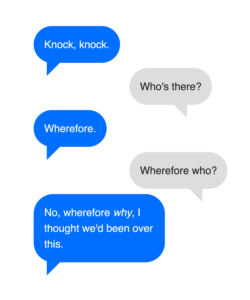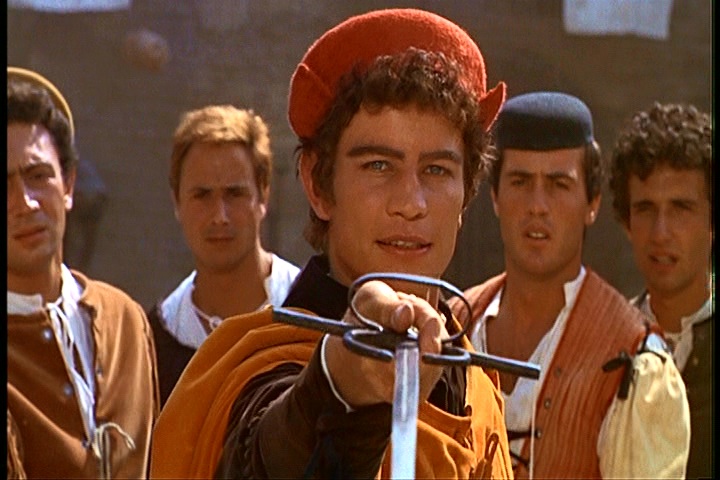Well, that was underwhelming. I think I can give it more of a chance now that the pilot is out of the way and it becomes its own story, rather than having to recap the changes they made to the Shakespeare original. But this just means that it pretty much gave us very little Shakespeare and will now promptly leave it all behind.
Right off the bat, Benvolio and Rosaline (who is now a servant in the Capulet house, even though she is still acknowledged as family) are witnesses to Romeo and Juliet’s wedding. There is no Nurse character – Rosaline is Juliet’s confidant, which turns out to be a very small role.
Tybalt and Romeo meet in the streets, Mercutio – who we only saw briefly a few minutes ago and who has no real lines – dives into the fight, promptly gets killed, Romeo then kills Tybalt without a second thought. He’s even a dick about it, when Tybalt says “I thought you wouldn’t fight me,” Romeo stabs him and says, “I lied” or “I changed my mind” or some other 1980’s action movie catch phrase. He then escapes in a ridiculous chase scene where one moment he’s sloshing through water with armed guards chasing him maybe 20 yards away, and in the next Friar Laurence is confronting Benvolio in a bar who says, “I gave Romeo a horse” and that’s that, he’s gone. But no worries, he’s heard that his wife died, so he comes back.
We all know what happens next – fight scene with Paris, drink poison (did we even see where he got the poison? I may have missed it), Juliet wakes up, drinks poison too (ok, bit of a liberty there). But! Paris is still alive!
The story is surprisingly full of holes for modern primetime standards. We open with Prince Escalus and his sister reassuring their dying father that everybody will know his proclamation – that anybody committing murder in Verona will be executed without trial. It’s repeated several times.
First…isn’t this a thing anyway? The way they spell it out makes it sound like we’re missing something, like this isn’t normally the way things would be done in this time and in this place. If you’re caught killing somebody, your life is forfeit. Not sure why he’s so big on making sure everybody understands this “new” rule.
Second, as an example of the weak writing – when Isabella (Escalus’ sister) repeats their father’s proclamation she says, “Any man accused of murder in the city of Verona will be executed without trial.” Excuse me? Any man accused? Without trial? Well that sucks. “Hey, I accuse that guy of murdering somebody.” *stab*
But! A few scenes later, when brother and sister are discussing it, here’s the dalogue:, Escalus is made to repeat, ”
Isabella “…until our father proclaimed…”
Escalus: “…That anyone who commits murder will be executed without trial.”
That’s literally NOT what he said, and Isabella knows that, since she said it herself two scenes ago.
Third, the whole thing is useless because not only does Escalus himself stab somebody soon after, but the entire city breaks out into a riot where people are just randomly killing each other in broad daylight all the time. Maybe it’s a rule that will come back around later in the series?
There’s all kinds of other weird back story added. Rosaline has a sister, and both come across like Cinderella to Lady Capulet’s wicked stepmother. I guess she resents them because she was jealous of their mother? They say Shakespeare’s hard to follow when he moves the plot along off stage, but I have no idea what’s going on here.
What this is all moving toward is Escalus ordering that Benvolio and Rosaline are to be married, to forcibly join the two houses. It doesn’t help that Escalus and Rosaline love each other, and Benvolio sees them together. I’m not sure why this matters, because Rosaline and Benvolio are playing the Beatrice/Benedick game and proclaim their hatred of each other every chance they get, so I’m not sure why Benvolio would suddenly be all jealous because a woman who he doesn’t love, who doesn’t love him, wants to be with a different guy.
Ultimately the only Shakespeare we really got was Mercutio saying “A plague on both your houses” and Romeo saying “Thus with a kiss I die.” Other than that this is just an entirely new story told with some of Shakespeare’s characters. It might turn out to be good, but there’s no point in following or reviewing it as if it’s got anything to do with Shakespeare. I’m still hoping for some flashbacks (I see that the IMDB entry for Romeo’s actor lists him as “unknown number of episodes”), but I’ll be surprised if we get any. We’re far more likely to get back story for Rosaline – her mother (and mother’s death), her relationship with Escalus, and so on.

 Not taking my eyes off the road I ask, “What’s that one from?”
Not taking my eyes off the road I ask, “What’s that one from?”
